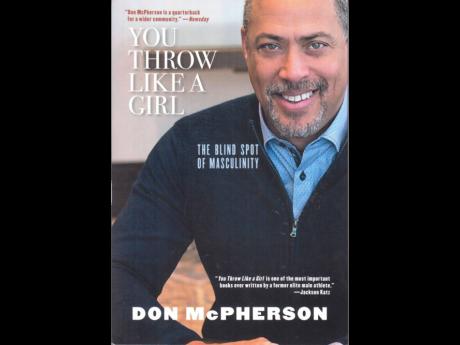A rigorous challenge to social norms
Book: You Throw Like a Girl: The Blind Spot of Masculinity
Author: Don McPherson
Critic: Glenville Ashby, PhD
You Throw like a Girl offers an insightful look into Western patriarchy. It is bold and uncompromising, indicting a long-standing Zeitgeist that has intrinsically marginalised and devalued one-half of society. This a challenging and far more complex a subject than imagined, and Don McPherson substantively adds to the narrative. A celebrated personality of Herculean stature, McPherson is a representation of the ideal in sports nomenclature, the very culture that has promoted a toxic mix of unbridled masculinity, strength, aggression, and invincibility. These attributes are not only mythical, according to McPherson, but contribute to stunted emotional growth in young men and a society rooted in male privilege and entitlement.
McPherson confronts the mandate of toxic masculinity. Of his awakening, he recalls, “There was no moment. No epiphany. At 29, I began to learn and grow and began to come to terms with how deeply ingrained the mandate of masculinity was and how misogyny and sexism had influenced so many aspects of my life.
McPherson veers into psychoanalytic thought. Maybe in the Oedipal dynamic the child is shaped for good or bad. He mentions naturally “kind” men, overtly masculine, that have been long sensitive to “our broken society.”
“Men I met were not just kind by nature; instead they recognised and confronted the myriad social pressures to adhere to sexist values.”
Of the “blind spot of privilege” and patriarchy, McPherson elaborates: “Our silence stems from the assumption that this is a women’s issue and men are unaffected. Our inaction results in a lack of growth and development of young men, leaving them more vulnerable to the repercussions of their behaviour by a society that is evolving without them.”
According to McPherson, these so-called “blind spots” are subliminally promoted and are an adjunct to a patriarchal archetype infecting many a social institution, in particular, the culture of sports.
“The industry,” he writes, “continues to perpetuate, promote and protect the myth of masculinity by focusing on highlighting the winner-take-all, zero-sum interpretation of competition.” He adds, “The narrow image of athletes, single-minded in their pursuit of victories, remains at the centre of sports’ cultural appeal and is inextricable from the hyperbole with which it continues to be presented.”
His is a clarion call for introspection. A society diseased with flippant concern for pervasive violence of its citizenry must pause and search its soul.
Poignant
Anecdotally poignant, McPherson recounts an episode – that of a siege-like atmosphere that gripped a neighbourhood after the assault on a young woman. It is an existential fear that men can hardly fathom. He assesses his own feelings and concludes: “The fear of a sexual predator was not something I considered. I inherently knew I was not the target – not because I was a large man, a black man, or a famous man. I was simply a man. A sadistic serial murderer was loose in my neighbourhood, and I felt no alarm, no threat; I did not alter my behaviour, modify my schedule, or change my daily habits. In no way did I consider my personal safety. He was not after me. However, the reality for my female friends was dramatically different. There was a profound amount of privilege in my ignorance and lack of empathy in that moment.”
McPherson blames the inability to handle rejection as the principal cause of violence.
“To be clear, rejection can take many forms. It can be momentous as leaving a marriage or other long-term relationship and minor as rebuffing a man’s overtures … In cases of long-term relationships … women are at the greatest risk of murder when they leave.
“Ironically, for men who react this way, their own self-worth is in question. Insecure in their masculine identity, they are dependent on women’s affirmation of them … With no other recourse to reconcile their privileged masculinity they lash out with an abusive retort like a petulant child who does not get the toy he wanted.
“There is also an insidious element of ‘protective patriarchy’ where a woman’s identity and worth are determined by a man. Women raised in this paradigm will be apprehensive to reject a man’s advances in anticipation of his hostile response, and this legitimises his anger and loss of power and control (of her).”
Throughout, McPherson risks alienating many that challenge feminist rhetoric. But he ably navigates the minefield of identity politics. His advocacy cannot be likened to a ‘Woke’ pamphlet or message of vengeful overreach.
Surely, his detractors will argue that McPherson does not address the groundswell of anti-male rhetoric spewed by an increasing radical society (while celebrating women that display the most obnoxious side of masculinity).
Unfailingly and regrettably, the power of femininity is neglected by women in pursuit of the masculine ideal, a testament to the overarching and archetypal nature of the phallus in Western society
It is important to note that McPherson does not malign masculinity. Moreover, he does not seed guilt and shame unto boys. Thankfully, there is no blind hagiography of women and wanton vilification of men. Masculinity is natural, healthy, and undeniable. However, nurtured and derailed by a skewed and toxic society, masculinity morphs into a raging libido that feeds on itself.
You Throw like a Girl does not and cannot address the origins, dynamism, and complexities of patriarchy. No one author can.
Soundly and clearly articulated, McPherson has emerged as a measured voice in an oftentimes kinetic and unsettling narrative. His is an exigent undertaking that requires input from every strata of society, a point he never fails to mention.
Publisher: Akashic Books, Brooklyn, New York
ISBN: 978-1-61775-705-1
Available at Amazon
Ratings: Highly recommended
Feedback: glenvilleashby@gmail.com or follow him on Twitter@glenvilleashby


